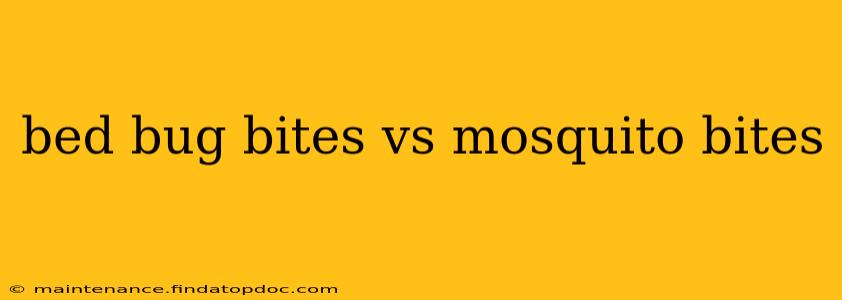Bed bugs and mosquitoes are both notorious for their itchy bites, but differentiating between the two is crucial for effective treatment and prevention. While both insects feed on human blood, their bites leave distinct marks and have different implications. This comprehensive guide will help you distinguish bed bug bites from mosquito bites, addressing common questions and concerns.
What Do Bed Bug Bites Look Like?
Bed bug bites typically appear as a cluster of small, red welts, often in a line or zig-zag pattern. This is because bed bugs often bite multiple times in close proximity during a single feeding. The bites themselves are usually painless at first, but they become intensely itchy within hours, sometimes even days after the initial bite. Unlike mosquito bites, bed bug bites don't typically have a central puncture point. The appearance can vary from person to person; some individuals have a mild reaction, while others experience significant swelling and inflammation.
What Do Mosquito Bites Look Like?
Mosquito bites are usually characterized by a single, red, raised bump with a noticeable central puncture point where the mosquito's proboscis pierced the skin. They often appear isolated rather than in clusters, although multiple bites are common, especially during a night's sleep. Mosquito bites are typically itchy, but the itching is usually less intense and less prolonged than that of bed bug bites. The surrounding area may also become slightly swollen and inflamed.
How Can I Tell the Difference Between Bed Bug and Mosquito Bites?
The key differences lie in the pattern of the bites, the presence of a central puncture mark, and the intensity and duration of the itching.
- Pattern: Bed bugs often bite in lines or clusters, while mosquito bites tend to be more scattered.
- Puncture Mark: Mosquito bites usually exhibit a central puncture mark, whereas bed bug bites typically lack this feature.
- Itching: Bed bug bites cause more intense and prolonged itching compared to mosquito bites.
Are Bed Bug Bites and Mosquito Bites Dangerous?
While generally not life-threatening, both bed bug and mosquito bites can pose various health risks:
- Bed Bugs: Beyond the intense itching and potential for secondary skin infections from scratching, some individuals experience allergic reactions to bed bug saliva. In rare cases, severe infestations can lead to significant emotional distress and sleep disruption.
- Mosquitoes: Mosquitoes are vectors for various diseases, including malaria, Zika virus, West Nile virus, and dengue fever. These diseases can range from mild to life-threatening, depending on the virus and the individual's health.
How Can I Treat Bed Bug and Mosquito Bites?
Treatment for both types of bites focuses on relieving symptoms:
- Over-the-counter remedies: Topical creams containing hydrocortisone or antihistamines can reduce itching and inflammation. Oral antihistamines can also help alleviate itching and allergic reactions.
- Cold compresses: Applying cold compresses to the affected area can reduce swelling and soothe itching.
- Avoid scratching: Scratching can worsen inflammation and increase the risk of secondary infection.
For severe allergic reactions, seek medical attention immediately. In cases of suspected mosquito-borne illness, consult a doctor for proper diagnosis and treatment.
How Can I Prevent Bed Bug and Mosquito Bites?
Prevention strategies differ significantly:
- Bed Bugs: Regularly inspect mattresses, bedding, and furniture for signs of bed bugs. Use mattress encasements, vacuum frequently, and consider professional pest control services if an infestation is suspected.
- Mosquitoes: Use mosquito repellents containing DEET, picaridin, or IR3535. Wear long sleeves and pants when outdoors, especially during dawn and dusk when mosquitoes are most active. Eliminate standing water around your home to reduce breeding grounds.
What if I'm unsure if I have bed bugs or mosquitoes?
If you're uncertain about the cause of your bites, it's best to carefully inspect your sleeping area for any signs of bed bugs. Look for small, brown insects, their eggs, or fecal spots on your mattress, bedding, or furniture. If you find evidence of bed bugs, contact a pest control professional immediately. If you can't find any bed bugs, the bites are likely from mosquitoes, but still monitor for any worsening symptoms or signs of illness.
This detailed comparison should help you distinguish between bed bug and mosquito bites. Remember, early detection and appropriate action are key to effective management and prevention of both.
